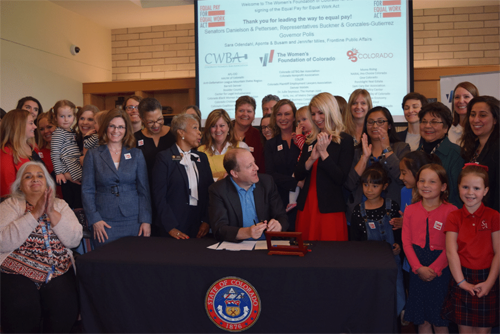This year, Equal Pay Day falls on March 15 in the United States. Equal Pay Day marks how far into the year that an average woman needs to work to earn the same amount of money as a man earned during the previous year working in the same job. It is meant to draw attention to the persistent gender wage gap that exists across most types of employment.
In 2020, the average woman earned 83 cents for every dollar an average man earned. The gap was higher for women of color: Black women earned 63 cents for every dollar earned by a white, non-Hispanic man and Latina women earned 57 cents for every dollar earned by a white, non-Hispanic man.

Colorado is actively attempting to close the gender wage gap through legislation. On January 1, 2021 the Equal Pay for Equal Work Act went into effect. While many states have passed equal pay laws, Colorado’s is unique because it requires employers to include salary ranges on job postings. This requirement improves wage transparency for job seekers.
Why is wage transparency important?
Increasing wage transparency by disclosing salaries on job postings allows people to see what their peers are earning, making it easier to find existing wage gaps and fight back against discrimination. According to the National Women’s Law Center, public sector jobs tend to have lower wage gaps than those in the private sector, likely because salary data for those positions is available to the public.
Posting salary ranges also allows women to negotiate for higher starting wages. When a salary range is not supplied by an employer, job applicants tend to ask for 10-20% more than their current salary. Because women are systematically paid less than men, their negotiations will start at a lower rate than a man with similar experience. This perpetuates gender- and race-based wage disparities.
How do I find salary information?
While including salaries on all job postings is a new requirement, public sector employers have been collecting, saving, and posting salary data for years. However, salary information can still be tricky to find! Below are a few tips that State Publications librarians use to find salary information:
- To find salaries for elected county officials, look for the most recent County Elected Officials’ Salary Commission report. The commission studies county elected official salaries and compares them to industry salaries.
- County governments are required by the state to publish salary information for all county employees and officials. This information is published twice per year, in August and February, in local newspapers. Salary information can also often be found on county government websites.
- A past State Publications blog post features a list of resources for looking up college and university employee salaries. The state does not require that universities publish this data, so the amount of publicly available information varies between institutions.
- The Department of Personnel & Administration publishes annual reports with an overview of state employee compensation and pay plans that show salaries associated with specific job titles.
- The Office of Labor Market Information operates the LMI Gateway, an easily accessible career and labor market information database. This office also produces regular publications highlighting occupational employment and wage statistics in Colorado.
- For historical salary information, search for the keywords “salaries,” “compensation,” or “wage survey” in our online catalog.
Learn more
Although the gender wage gap is a multi-faceted issue, pay equity laws that require wage transparency are one powerful way to combat pay discrimination. To learn more about efforts to increase pay equity in Colorado, check out the resources below:
- Fulfilling the Promise: Closing the Pay Gap for Women and Minorities in Colorado (Pay Equity Commission, 2008)
- 2014 Sunset Review: Colorado Pay Equity Commission (Dept. of Regulatory Agencies)
- Issue Brief on Gender Pay Equity (Legislative Council Staff, 2019)
- Celebrating Colorado’s immigrant heritage - June 27, 2025
- Colorado’s Scenic and Historic Byways: Guanella Pass - June 6, 2025
- Who is protecting Colorado’s pollinators? - May 16, 2025